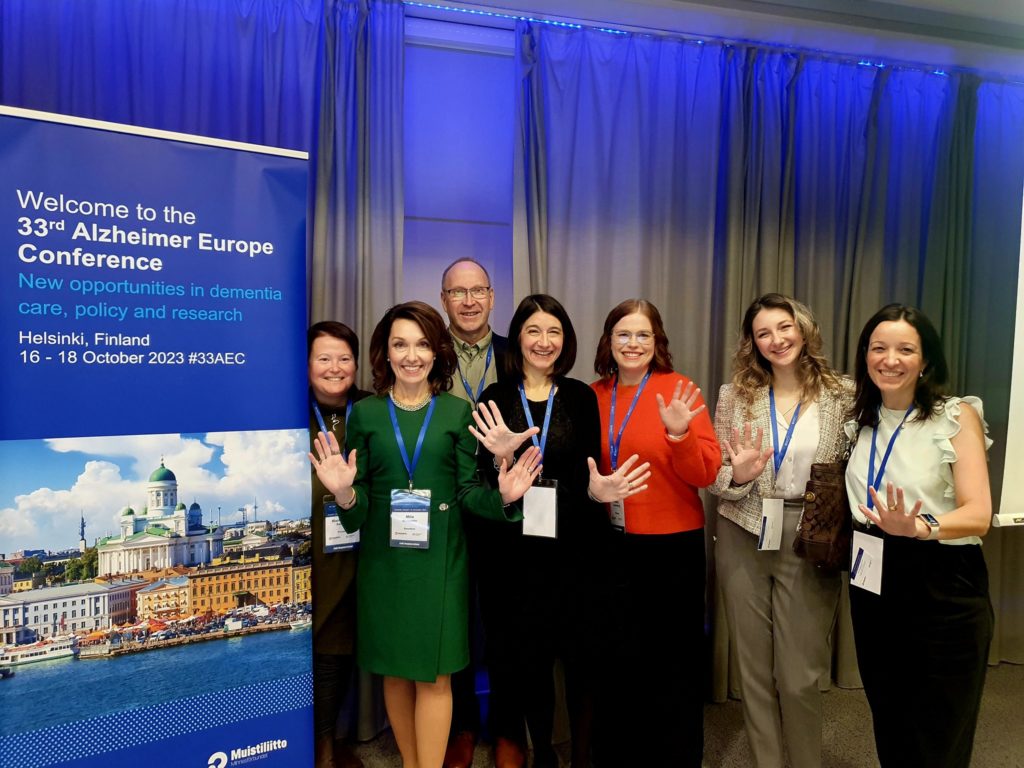The 33rd Alzheimer Europe Conference (#33AEC) “New opportunities in dementia care, policy and research” was formally opened on 16 October in Helsinki, Finland. The conference was held as a hybrid event, with delegates and presenters able to join either on site or online, thus making it as accessible, inclusive and interactive as possible. A record number of over 1,100 participants from 48 countries attended the conference, which took place over three days, ending on 18 October 2023.
A session entitled ““Precision prevention of Alzheimer´s disease and dementia: advancing multidomain interventions” was dedicated to the EU-FINGERS project. Miia Kivipelto (Karolinska Institutet, Sweden) project coordinator of EU-FINGERS moderated the session. First, Francesca Mangialasche (Karolinska Institutet, Sweden) gave an overview of the JPND-supported project, aiming at developing a novel methodology for precision prevention of Alzheimer´s disease and dementia, based on the successful experience of the multidomain, lifestyle-based Finnish Geriatric Intervention Study to Prevent Cognitive Impairment and Disability (FINGER). Next, Mariagnese Barbera, (University of Eastern Finland, Finland) gave an update on MET-FINGER, which is the first trial combining a multimodal lifestyle intervention with a putative disease-modifying drug for cognitive decline prevention, named Metformin. Alara Abaci (Karolinska Institutet, Sweden) then presented the results of a study investigating the perspectives of memory clinic patients regarding research participation. Findings showed considerable variation in memory clinic patient perspectives regarding research participation, and identified facilitators and barriers for intervention trials. To close the session, Ana Diaz (Alzheimer Europe, Luxembourg) pointed out the importance of exploring and involving members of the public in brain health research and described the approach used to set up the EU-FINGERS Advisory Board as well as its impact on the project. Finally, Anna Rosenberg (Finnish Institute for Health and Welfare) and Petri Lampinen (Finnish EU-FINGERS Advisory Board member) shared both their views on the EU-FINGERS Advisory Board, which provides feedback and advice to the EU-FINGERS researchers about various topics and issues linked to the research activities conducted by the consortium.
In addition to the EU-FINGERS session, Miia Kivipelto was the first speaker of the second plenary of the conference on “Brain health and prevention”, discussing “Building the evidence base for multi-modal interventions through European and International collaborations”. She said that risk reduction of cognitive impairment and dementia is possible and indeed is already happening. Brain health, she stressed, should be a priority for society. With an increasing body of evidence from clinical trials to show that multidomain interventions targeting several risk factors are effective and feasible, the EU-FINGERS and World-Wide FINGERS networks are now working on further developing and adapting these interventions to different target populations and settings.
We were glad that several members of the EU-FINGERS Advisory Board were in attendance and were able to join on-site and online.
More information about EU-FINGERS’s work can be found in the recently supplement published with new Dementia in Europe magazine at 33rd Alzheimer Europe Conference here.


